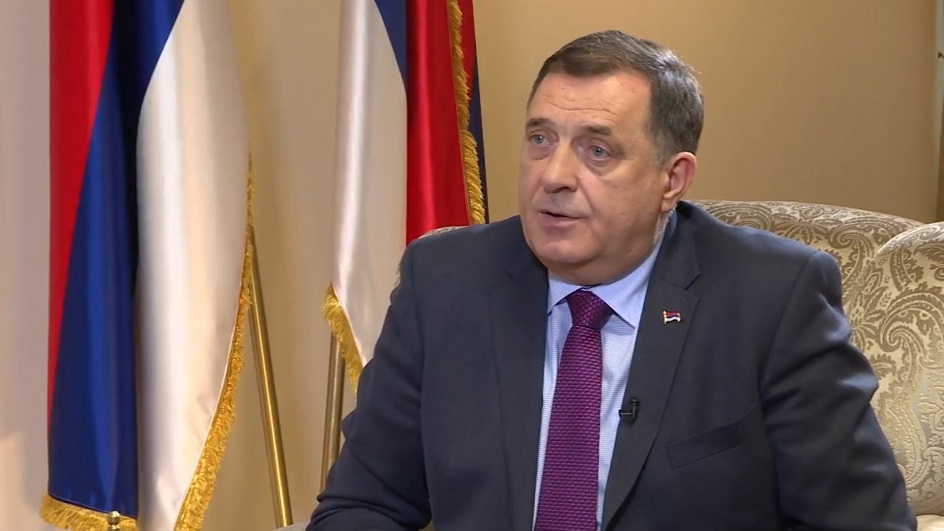Dodik: The solution to the current crisis is the secession of Republika Srpska

A solution to the current political crisis that erupted in Bosnia on Wednesday is for the Bosnian Serb-majority region, Republika Srpska (RS), to secede, Bosnian Serb leader Milorad Dodik told N1 in an interview.
“The solution will be for the RS to go its own path, form its independent state bodies which will function on RS territory. It has all the elements of a state, its institutions, its people,” he said, explaining that Bosnia’s 1995 peace agreement, which contains the Constitution, has already been breached repeatedly by international officials.
Dodik spoke after representatives from the semi-autonomous RS entity unanimously decided to stop participating in any decision-making processes until a law is passed which would remove all foreign judges from the Constitutional Court.
Bosnia is divided into two semi-autonomous entities, one dominated by Serbs, the other shared mostly by Bosniaks and Croats. The entities have their own governments and parliaments but are linked into one state by joint institutions that are comprised of representatives of all three groups.
The decision by RS representatives came after the Constitutional Court declared an RS land bill law unconstitutional.
The bill declared that land that had belonged to former Yugoslavia now belongs to the RS and not the state of Bosnia and Herzegovina. The country’s Constitutional Court, however, ruled at its last session that this law is unconstitutional and that Bosnia and Herzegovina should be the owner of such land.
For years Dodik kept accusing three international judges of the Constitutional Court of always siding with the two Bosniak judges at the expense of the two Serb and two Croat judges. He is arguing that the Court was consistently working against Bosnian Serb interests.
After the latest decision, he wants foreigners out or Republika Srpska will go its own way, he said.
“We are staying to participate in the state bodies but no decisions will be adopted. We will gather all Serbs who work there. It was agreed that this will happen in the Parliament and the Council of Ministers,” Dodik said.
Dodik himself is the Bosnian Serb representative in the three-member state presidency which can pass decisions only by consensus.
“I will be present at the Presidency meetings and I will start vital national interest procedures for everything, even if we talk about the weather forecast,” Dodik said, explaining how he intends to obstruct the work of the body.
He said the RS National Assembly will “withdraw and cancel all of its endorsements” of reforms.
“We might adopt a decision to form an RS Army. The US Embassy, which keeps preaching to us, is not going to be the one who tends to our rights. Enough of that, you can’t keep doing this,” he said.
“You have struck wherever the Serb people live. What do you want? Who are you? Nobody in the RS will respect any OHR decisions anymore,” he said, referring to the Office of the High Representative, the foreign diplomat overseeing the civilian implementation of the 1995 Dayton Peace Agreement which contains Bosnia’s Constitution.
He went on to say that the High Representative, currently Austrian diplomat Valentin Inzko, “is an international criminal who had breached the Constitution and the Dayton Agreement.”
He also stressed that Bosnia is a state that was imposed upon Serbs who did not want it and that it has proven to be a bad place for them.
“We will secede from Bosnia and Herzegovina one day. We don’t want anybody to destroy our freedom,” he said.
“The Bosniaks think that the US Embassy will solve their problems - well let’s see how they will do that,” he added.
Dodik argued that he entered the Bosnian Presidency with the best of intentions to initiate processes to improve Bosnia’s economy but that his Bosniak and Croat colleagues in the institution always first ask the US Embassy about everything.
He predicted Bosnia’s future scenario, also accusing Bosniaks of overvoting the less numerous Croats in Bosnia’s other entity, the Federation (FBiH), and arguing that the Croat-majority area in the country should secede as well.
“The RS will be a state, Herzeg-Bosnia the other one and Bosnia will be the place where Bosniaks live,” Dodik said.
Kakvo je tvoje mišljenje o ovome?
Učestvuj u diskusiji ili pročitaj komentare





 Srbija
Srbija
 Hrvatska
Hrvatska
 Slovenija
Slovenija







